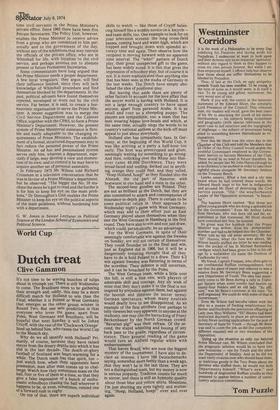World Cup
Dutch treat
Clive Gammon
It's not time to be waving bunches of tulips about in triumph yet. There is still Wednesday to come. The Brazilians seem to be gathering their strength and, oddly, this may be a more difficult match for Holland to win than the Final, whether it is Poland or West Germany that emerges as the other group winner in Round Two. But one safe prediction is that everyone who loves the game, apart from Poles, West Germans and Brazilians, will be hopeful that next Sunday it will be Johan Cruyff, with the rest of the 'Clockwork Orange' lined up behind him, who raises the World Cup to the Munich sky. Why do we all identify with Holland? Primarily, of course, because they have raised soccer from the dreary depths into which it has slid in the last decade. The death-or-glory football of Scotland was heart-warming for a while. The Dutch team has that spirit, too — just watch how, when their opponents have possession, man after man comes up to challenge. Watch how they sometimes mass on the ball, four or five of them at a time, so that they give a false impression of a bunch of enthusiastic schoolboys chasing the ball wherever it happens to be, or even, sometimes, remind one of a forward rush in rugby.
On top of that, there are superb individual. skills to watch — like those of Cruyff balancing himself like a wobbly novice on a. bicycle — and team skills, too. One example to look for on your television screens: the long cross-field passes, coming hard and waist-high, which are trapped and brought down with splendid accuracy time and again. Then observe how the recipient is moving forward with no apparent time interval. The "whirl" pattern of Dutch play, their great unexpected gift to the game, has been widely noted. It is this that gives the impression of schoolboy play, but of course it is not. It is more sophisticated than anything else that has been seen in the stadia of Germany in the last weeks. The Dutch have simply abolished the idea of positional play.
But leaving that aside there are plenty of other factors to account tor the love affair that the soccer world is having with Holland. It is not a large enough country to have upset anyone, apart from paranoid Arabs. It is as small and cosy as a sheepdog puppy. The players are sympathetic, too: a team that has men wearing hippie love-beads and which, at the same time, actually sings the words to its country's national anthem at the kick-off must appeal to just about everybody.
Holland also has sympathetic fans, In Germany, at the beginning of this World Cup, it was like arriving at a party a half-hour too early. The host was preoccupied and glum, seemingly waiting for something to go wrong.
And then, rollicking over the Rhine into Han over came 40,000 Dutchmen. They were broad-faced and smiling; decked out in anything orange they could find, and they yelled, "Hoep Holland, hoep!" as they flooded into the Altstadt, the old part of Hanover, with bratwurst in one hand and a stein in the other. The second-best goodies are Poland. They are not as brilliant as the Dutch, but they are also committed to attack and contemptuous of • insurance-in-depth play. There is certain to be some political relish in their approach to Wednesday night's game with West Germany, which may add to their effort just as East Germany played above themselves when they met the West Germans in Hamburg in the first round. They have also to win. and not just draw, which could, paradoxically, be an advantage. For the West Germans, in spite of their seemingly comfortable win against the Swedes on Sunday, are still not certain of themselves. They could flounder on to the final and win, just as England did in 1966, but it will be a dangerously tempting thought that all they have to do is hold Poland to a draw. Their 4-2 win against Sweden was flattering in terms of the scoreline. Their defence is still uncertain, and it can be breached by the Poles.
The West German team, while a little over the hill, is still a fine one, with players of admirable skill and courage. Any sly wish of mine that they don't make it to the final is not inspired by prejudice against them, but against the boorish and illiterate (in soccer terms) German spectators, whom many neutrals would dearly love to see disappointed. As an example of the first attribute (lost perhaps to telly viewers but very apparent to anyone at the stadium), one may cite the barracking of Franz
Beckenbauer by the North German crowd:
"Bavarian pig!" was their refrain. Of the second, the stupid whistling and booing of any back pass to the goalie, regardless of circumstance. Their general reading of the game would turn an Anfield regular white with embarrassment.
That leaves Brazil, who are now the biggest mystery of the tournament. I have also to de clare an interest. I have 100 Deutschemarks saying, somewhat more feebly than a week ago, ,that they won't be in the last three. They are
not a distinguished team, but my money is now in serious jeopardy. Tradition counts for much in soccer, and there is still an hypnotic quality about those blue and yellow shirts. Meantime, I'm just shutting my eyes tightly and mutter ing, "Hoep, Holland, hoep!" over and over again.


































 Previous page
Previous page